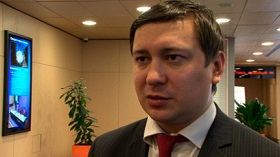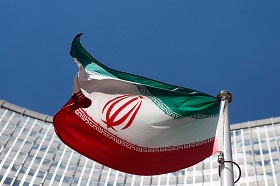On August 29, 2014, Iranian Foreign Affairs Minister Javad Zarif will pay an official visit to Russia, during which he will meet with his Russian counterpart Sergei Lavrov. It is anticipated that the ministers will discuss Iran's nuclear program, bilateral cooperation, and the Astrakhan summit of the Caspian littoral states' leaders scheduled for late September 2014. Director of the Center for Energy and Security Studies Anton Khlopkov shares his insights on issues related to the upcoming visit.
On August 29, 2014, Iranian Foreign Affairs Minister Javad Zarif will pay an official visit to Russia, during which he will meet with his Russian counterpart Sergei Lavrov. It is anticipated that the ministers will discuss Iran's nuclear program, bilateral cooperation, and the Astrakhan summit of the Caspian littoral states' leaders scheduled for late September 2014. Director of the Center for Energy and Security Studies Anton Khlopkov shares his insights on issues related to the upcoming visit.
How do you assess the prospects for the next round of talks on Iran's nuclear program, scheduled for November 2014?
The United States and Iran have already launched bilateral consultations in Geneva via diplomatic channels, while contact between Iran and other countries involved in the negotiations takes place on a regular basis – in the P5+1 countries’ embassies in Iran and Iranian embassies in the P5+1 countries’ capitals, where they exist. November 24, 2014 has been set as the deadline for reaching and signing a comprehensive settlement on Iran's nuclear program.
I think, given the obstacles to reaching an agreement, this is an extremely ambitious goal. The issue at hand is not just the need to develop mutually acceptable solutions to existing problems, such as Iran’s uranium enrichment levels for the next 10-15 years, but also the need to shape the format of Tehran’s obligations in that regard, and outline verification procedures. It is also necessary to develop both the mechanism and time frame for the P5+1 group to lift the sanctions on Iran – both those imposed by the UN Security Council and the unilateral ones imposed by the United States and the European Union.
I believe that the agreement could be reached by November 2014, although a number of technical issues will remain unresolved and the dialogue on them will continue after November. It is unlikely that agreement will be reached on all the details within the remaining three months, however intensive the bilateral dialogue between Iran and P5+1 representatives, including Russia or the negotiations between the P5+1 group and Iran that are to resume imminently – first in New York as part of the UN General Assembly, and then in Vienna.
Iranian Foreign Minister Javad Zarif will visit Russia on August 29, 2014. In your opinion, what issues will talks with his Russian counterpart Sergei Lavrov cover?
There are two groups of questions. First, the meeting provides a good opportunity to discuss the current stage in resolving the crisis over Iran's nuclear program. Second, the meeting makes it possible to discuss a wide range of bilateral issues, including trade and economic cooperation: it is no secret that over the past two years volume has significantly decreased. Of course, this trend is not in the interests of either Iran or the Russian Federation. It is obvious that in today’s new environment, in which Russia has imposed an embargo on EU food imports, Iran is potentially poised to play a more active role in filling the gap in the domestic market left by the ouster of European suppliers. With fruit and vegetable supplies taking the brunt of the impact, Iran is consistently stepping up its exports to Russia, and there are good prospects for further growth.
The talks will also cover strategic issues such as cooperation in the field of security. Russia and Iran share common interests in this field in many areas and regions. The current situation in the Middle East is a major concern for both Russia and Iran. Escalating destabilization, the growing power and influence of non-state actors in the Middle East are in neither Iranian nor Russian interests, as they pose a short-term threat to Iran and a medium-term threat to Russia. Issues related to the Caspian Sea and Central Asia are also considered strategic.
The meeting of Ministers Sergei Lavrov and Javad Zarif is important in terms of preparations for the summit of the Caspian littoral states' leaders scheduled for late September 2014. Iran’s President Hassan Rouhani is due to arrive in Astrakhan on September 29. Obviously, there are a number of areas in which concrete and practical decisions can be arrived at within the framework of both the Summit of the heads of Caspian Sea littoral states and bilateral meetings between President Vladimir Putin and President Hassan Rouhani. In my opinion, scientific and technical cooperation between the two countries is also quite promising, especially as in the 1990s it was massively scaled down by the Russian Federation under United States’ pressure. The great potential in this sphere is apparent, especially given the solid grounding of engineering specialists in both the Russian Federation and the Islamic Republic of Iran.
Interviewer: Maria Gurova, RIAC Program Assistant





